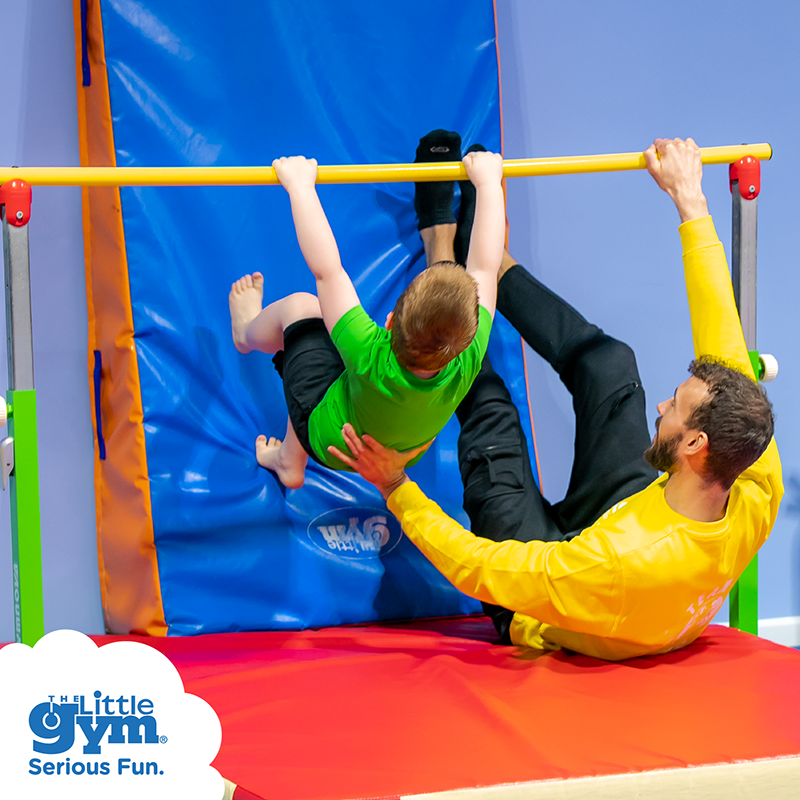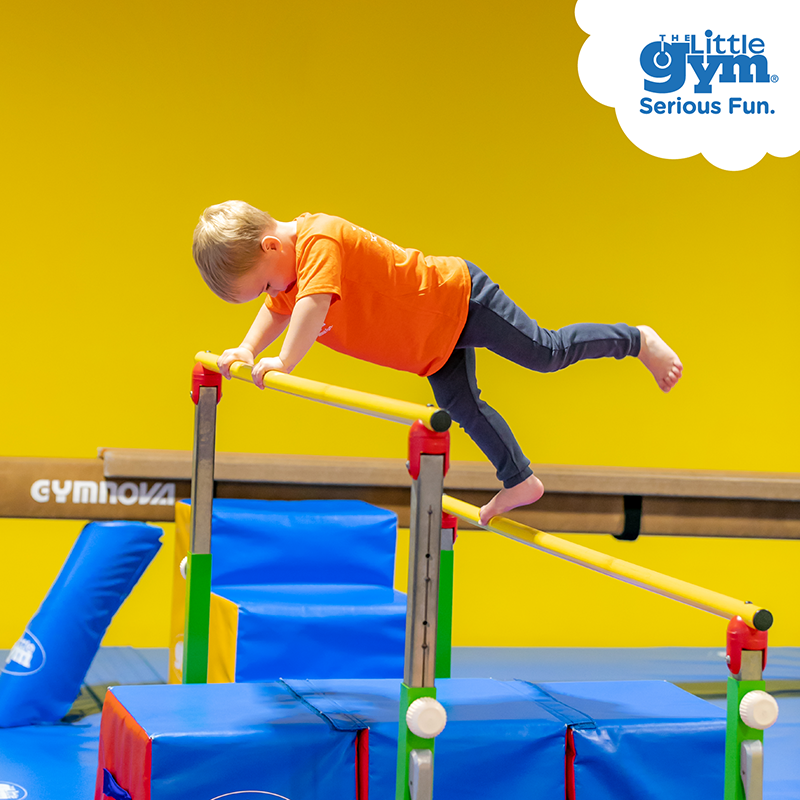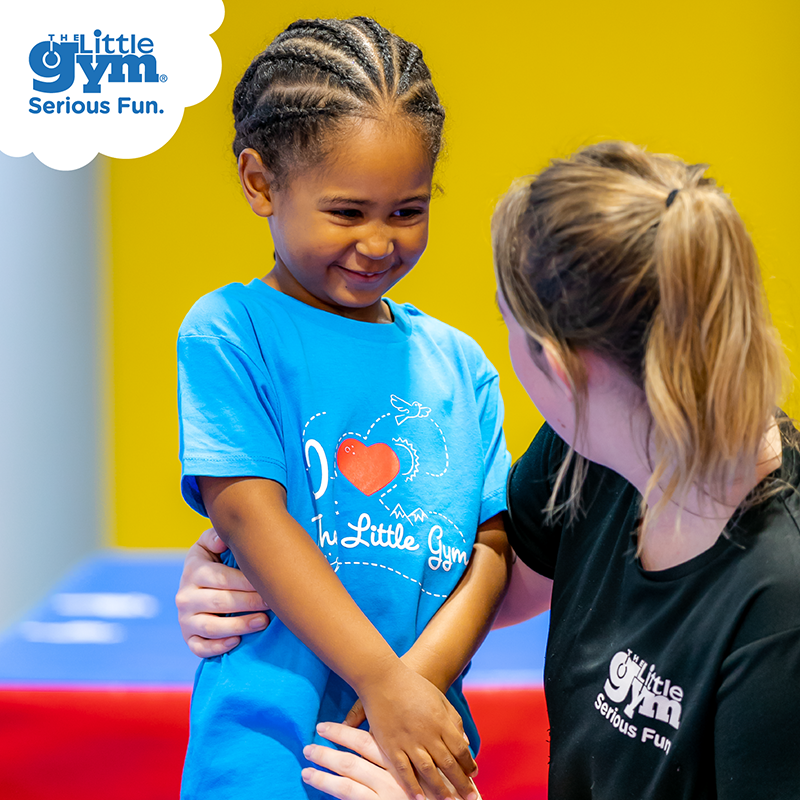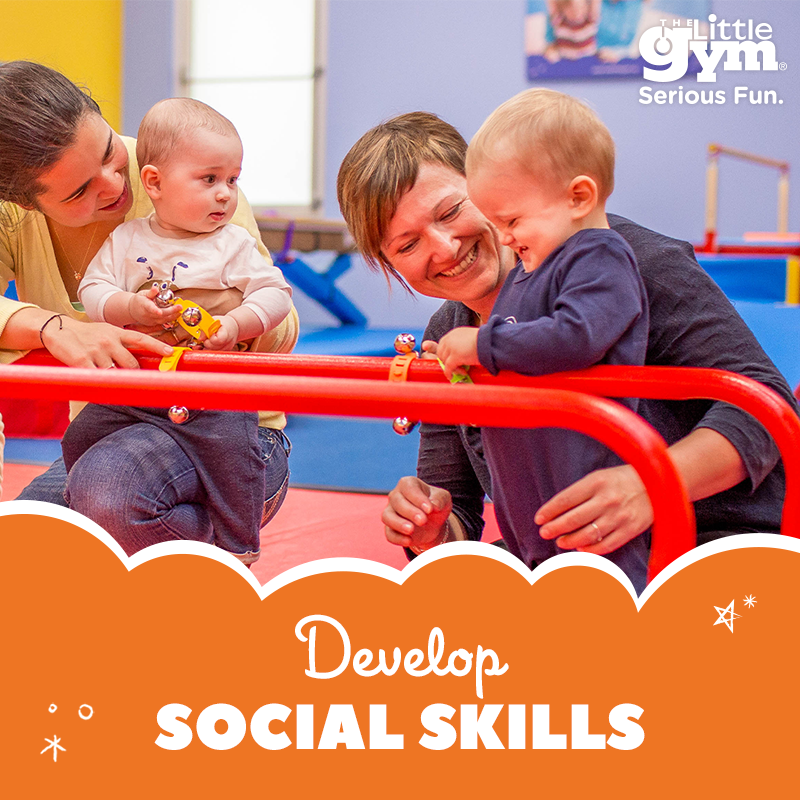Who We Are at
THE LITTLE GYM
Discover a world of endless possibilities for your kids with The Little Gym!
Watch your kids develop new skills, boost their confidence, and make new friendships while you enjoy some well-deserved "me-time" with a cup of coffee
and the opportunity to make new friends too! Don't miss out on this amazing chance to create unforgettable memories with your loved ones.
Explore our exciting class offerings today and reserve your place!
With nearly 50 years of expertise, we know how to make movement fun and how to develop emotional and social skills.
Our Philosophy of
Three Dimensional Learning
At The Little Gym, our environment is fun, but our purpose is serious. That’s why we embrace a proprietary philosophy called Three-Dimensional Learning, in which physical activity is a conduit for nurturing your whole child. The Three-Dimensional Learning approach to skill development means that every class we offer fosters growth in three holistic dimensions—Brain Boost!, Get Moving! and Life Skills! Read on to see how each dimension of learning helps your child grow into a well-rounded, well-adjusted child.
Get Moving
Developing flexibility, strength, balance and coordination through varied physical activities.
Brain Boost
Nurturing listening skills, concentration and decision-making that benefit your child well beyond the gym.
Life Skills
Promoting sharing, teamwork, cooperation and leadership through spending time with friends and peers.
Our Philosophy of
Three Dimensional Learning
At The Little Gym, our environment is fun, but our purpose is serious. Read on to see how each dimension of learning helps your child grow into a well-rounded, well-adjusted child.
Get Moving
Developing flexibility, strength, balance and coordination through varied physical activities.
Brain Boost
Nurturing listening skills, concentration and decision-making that benefit your child well beyond the gym.
Life Skills
Promoting sharing, teamwork, cooperation and leadership through spending time with friends and peers.
GYMNASTICS CLASSES
For every stage of your child's development - from 4 months to 12 years - The Little Gym offers a diverse line up of classes filled with movement, music, learning and laughter. Your little ones will make friends, reach developmental milestones and build self confidence while having Serious Fun.
Explore the range of classes and fun activities for kids we offer at The Little Gym® .
More than 45 years of
SERIOUS FUN
An innovative educator, musician and kinesiologist, Robin Wes envisioned a nurturing place where children could explore their physical development while also growing socially, emotionally and intellectually. He opened the first The Little Gym in 1976 in Bellevue, Washington and infused those early classes with the same positive, non-competitive spirit that characterises us today. Forty years later, children in more than 400 locations worldwide experience the Serious Fun of The Little Gym.
LATEST NEWS & OFFERS
![]()

Big Benefits of Extracurricular activities for kids
#GetMoving!
A school year is about to end! Can you believe it? Nope, not us either. Whether your child is school-aged or not, now is a good time to start thinking about which extracurricular activities you're going to enrol your child in after the summer holiday. Extracurricular activities outside of the home and classroom provide children of all ages a multitude of benefits like socialization, physical activity, and so much more.
Read on to check out 4 of the BIG benefits of extracurricular activities for your child.
1. Routine. Consistent, scheduled extracurricular activities help children anticipate what will happen next. This provides a sense of security, control, and confidence. For young children, involvement in extracurricular activities also provides structure to prepare them for school and beyond.
2. Socialization. For younger children, extracurricular activities, like The Little Gym, provide an opportunity for children to develop and grow important social and communication skills. For older children, extracurricular activities help to strengthen communication skills and build friendships.
3. Skill Development. Extracurricular activities allow children to explore new interests and skills which can help them find things that they are passionate about. This could be an affinity for a specific sport, playing an instrument, or even an interest in art. Developing new skills, and discovering those you like, can help build confidence and self-esteem.
4. Active Play. Many extracurricular activities are movement-based, these can include gymnastics and dance like The Little Gym. Activities that include physical activity not only help to keep children healthy, they have also been proven to help children achieve better performance in the classroom.
It’s important to let your child explore a wide range of extracurricular activities to help them find which activities they like best. This will help them learn a multitude of skills and will set them up for success later on in life!
To learn more about The Little Gym programs and to find a The Little Gym location near you visit our website

10 tips for boosting your toddler’s development
#BrainBoost!
A toddler's brain is growing at a phenomenal rate!
During the first three years of life, a child grows trillions (yes, trillions) of brain cell connections called neural synapses. To put that into perspective, a toddler has twice as many neural connections as an adult. It’s during infancy and toddlerhood where parents need to provide their child with emotional, physical, and cognitive rich experiences to help them learn and grow. Neural connections and patterns must be built - even for toddlers it’s a use it or lose it situation.
Check out our top 10 brain boosting tips for your toddler’s development.
1. Talk to your toddler. The more words a child hears gives them a better opportunity to learn and understand language. Brain boosters like cues, gestures, and repetition help your child understand exactly what you’re saying. While they may not be able to respond yet, their wheels are turning and soon enough they will be chatting away.
2. Sing a song. Not only is singing fun for children, it also has the ability to help them learn numbers, letters, animal sounds, and so much more. Plus, it’s fun, and they don’t care how bad you sound.
3. Engage in mirror play. Mirror play is a great way for children to learn different body parts, explore facial expressions, and have fun. Simply sit in front of a mirror with your toddler and point out different body parts or make different faces. Soon enough your child will naturally mimic your actions. This is great practice for social interactions later in life.
4. Explore different textures. Toddlers are sensory learners which means that they need to touch, smell, and taste in order to understand the world around them. Ever notice how many toddler games end up in their mouth? Expose your child to things like sands, paints, cotton balls, and ice cubes. Even simple activities like sitting in the grass offers lots of opportunity to explore trees, grass, dirt, and maybe a harmless bug or two.
5. Explore enrichment programs outside of the home, like The Little Gym. Not only will your toddler have the opportunity to interact with children their age, they’ll also be learning and having fun in a joyful safe environment with an age-appropriate curriculum that’ll boost child development.
6. Imagination Station. Toddlers can learn and grow communication and social skills through imaginative play. Provide your child with stuffed animals, puppets, dolls, or action figures and dress up clothes like old hats, shoes, and costumes.
7. Read aloud to your toddler every day to help increase language development and listening skills. Get your toddler involved in the activity by asking them to turn the page or point out specific items on each page.
8. Get moving and explore! There is nothing worse than having a toddler confined to the four walls of your home (if you have a toddler, you know). Explore the neighbourhood, local library, or even the mall. While you explore, point out all of the different things you see and sense (use all 5). Not only will this expose your child to different places, it will also expose them to different situations.
9. Be a positive example. Your little sponge isn’t just absorbing experiences they’re having, but the experiences they witness as well. Use moments of emotional expression about feelings and expressing kindness to teach little ones about empathy and understanding. Express your own emotions of happiness and joy when interacting with your
10. Opposites attract. Show your child the concept of opposites like soft / hard, big / small, inside / outside, and in / out to name a few.
Activities like The Little Gym can be another great option for busy families providing age-appropriate programs available after school, on weekends, and even when school is not in session.

5 Little Ways to show love to your kids
#LifeSkills!
Showing your child extra love doesn’t cost a thing. In fact, there are lots of ways you can incorporate love and quality time into your family’s daily routines to show that you love your children. Not only will your child feel loved, they’ll feel important too. Experts say when children feel important that they have higher self-esteem and a more positive outlook on life. You’re also teaching your kids how to show affection, which will benefit their friends and family as they grow older.
Check out these 5 little ways you can show your kids extra tender loving care!
1. Spend 1-on-1 time with your child. It’s important to make time not only for yourself but for your kids too! Schedule special 1-on-1 quality time with each of your children doing something that they enjoy. It could be something as simple as playing a board game together, or going on a date to the local ice cream shop! This is especially important for those with multiples as 1-on-1 time is extra valuable.
2. Provide your child with genuine praise. A simple, “I’m proud of you for working so hard” goes a long way, and can make the little accomplishments seem so BIG. Specific, sincere praise will not only help make your child feel special, it will also build their self-confidence. This is a great way to teach a growth mindset to kids by praising for perseverance versus intelligence.
3. Surprise them! Send a special note in your child’s lunchbox, show up at school unannounced for lunch, or surprise them with their favourite meal for dinner. These little tokens of affection go a long way and will make your child feel extra-loved!
4. Make night-time routines special. With busy workdays and extracurricular activities, evenings can be a bit hectic, but, it’s important to slow down and enjoy some quiet quality time with your children each night. Make an effort to chill out with your child each night and read a book or ask them a few of these questions.
5. Really listen to your child. Undivided attention, without smartphones, tablets, TV’s, or other distractions, is one of the best ways to show love to your child. Set a goal to have one to two tech-free hours a night to spend time enjoying each other’s company in the present moment.
Showing your child a little extra TLC every once and a while will help them feel important, and loved! Just like adults, kids interpret love differently.
Try several of the suggestions for ways to show love to see which your child enjoys best.
To learn more about The Little Gym and to find a location near you visit us here.

Raising Kids with an attitude of gratitude
#Lifeskills!
Raising children is a big job with lots of responsibility, and fun, of course! Parents strive to raise kids who are happy, respectful, and appreciative for everything they have. Often times, there’s a struggle between making sure our children act less entitled, express more thankfulness and act more grateful for all of they have in their lives.
Teaching children about having an attitude of gratitude is a great way to instil thankfulness and to bolster their happiness as they grow through life. According to research by the Greater Good Science Center at UC Berkeley, people who practice a grateful attitude are more joyful, enthusiastic, interested, and determined. Need we say more?
Check out these 5 ways parents can encourage and instil, age-appropriate gratitude.
1. Count (and name) your blessings. We often get bogged down by the daily grind and this lesson is great for parents and kids. Count your blessings by practising gratitude in daily conversations with your child. This will help them understand how, and why, they are to be grateful for everything they have. Try incorporating this into your dinnertime conversation. Go around the table and ask each person what they are thankful for and watch your family’s blessing pile up.
2. Choose quality time over material things. Spending quality time with your child goes far beyond gifting them the latest toys or video games. Your child will remember the memories you made together over any material items. A few ideas are to go out for a treat, sing songs or holiday carols in the car, or take them to the store for a (short) shopping trip.
3. Lend a helping hand to those in need. Encourage your child to take initiative to help an elderly neighbour with their yard work, a younger sibling with homework, or volunteering at a local food bank or animal shelter. Kids who give their time and energy to others often are less likely to take what they have for granted.
4. Get the kids involved in household tasks. Kids of all ages can participate in daily, age-appropriate household chores like picking up toys, washing the dishes, setting the table and so much more. Children who assist with household tasks have a higher sense of gratitude for the things they have.
5. Keep your manners in check. Teach gratitude by instilling manners like “please” and “thank you” in everyday conversations. Role play with your child and ask them how they would feel if someone didn’t use their manners. This will help children understand why using manners is so important!
Having an attitude of gratitude is something that is not only taught, but modelled as well. Parents and children alike have plenty of opportunities throughout their days to express and feel gratitude. Amplifying moments of gratitude help encourage and motivate children to continue to display positive behaviour and truly have an attitude of gratitude!
The Little Gym is grateful for all of its wonderful little patrons and parents!

Boost Your Child’s Social Skills
#Lifeskills!
Social skills are an essential component of child development. Social skills are necessary for communicating, interacting, and building and maintaining relationships with peers, parents, and teachers.
In fact, recent studies show that children who share, cooperate and are helpful are four times more likely to graduate from college than children who lack these social skills. It's never too soon to think about the future right? It’s important to grow and nurture a child’s social skills to ensure that they are set up for social success.
Check out these four tips for helping your child develop and grow their social skills:
1. Play: Children learn social skills by interacting with one another. Provide your child with opportunities to interact with other children their age by coordinating play dates, getting involved in team sports, and through age-appropriate programs like The Little Gym. Exposing your child to different social situations will help them learn skills like sharing, waiting their turn, being kind to others and working together.
2. Listen: Listening can be a difficult exercise for small children but it’s an important one to learn. Practice listening through fun games like; Red Light, Green Light or Simon Says. Improved listening skills will help your child engage in more meaningful conversations with their peers.
3. Teach: Teach your child about being empathetic to others’ feelings. Role-play with your child and ask how certain situations would make them feel. Demonstrating compassion and empathy plays a large role in a child’s social development.
4. Demonstrate: Lead by example – the most effective way to teach children is to model the behavior you want to encourage! As a parent or guardian, you are the hero in your child's eyes so they pay attention to most or all of the things that you do. Demonstrate pro-social skills like listening, sharing, taking turns, and showing respect and your child will be more likely to mimic your actions.
Every child develops social skills at their own pace. Whether your child is naturally outgoing or shy, these tips will help you set your child up for social success in the classroom, on the playground, and at The Little Gym!
Enquire today into our The Little Gym programmes for Babies, Preschoolers or Grade schoolers. Find a gym near you

